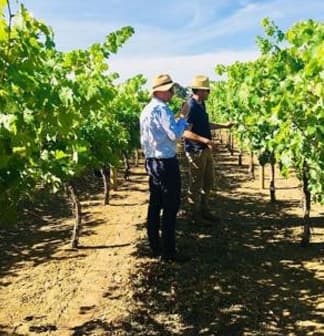1. OBJECTIVE
Pernod Ricard Winemakers Pty Ltd (Pernod Ricard Winemakers, we or our) recognizes that slavery is a violation of fundamental human rights. We are committed to doing business with integrity and to implementing and enforcing systems and controls to ensure that the risks of modern slavery practices in our business and our supply chains are identified and addressed.
2. SCOPE
This policy applies to all persons working for Pernod Ricard Winemakers in Australia or in any way related to its operations in Australia or on its behalf in any capacity, including employees, directors, officers, seconded workers, agency staff, contractors, external consultants and business partners.
3. POLICY STATEMENT
3.1. Modern slavery
Slavery is a crime and a violation of fundamental human rights. Modern slavery takes various forms, such as those outlined in the Modern Slavery Act 2018 (Cth) (Modern Slavery Act) including slavery, servitude, forced and compulsory labour, forced marriage, debt bondage, human trafficking, deceptive recruiting for labour or services; and the worst forms of child labour. All of these practices involve the deprivation of a person’s liberty by another in order to exploit them for personal or commercial gain and Pernod Ricard Winemakers is committed to addressing the risks of them occurring in its business and supply chain.
3.2. Zero-tolerance approach
Since 2003, Pernod Ricard has been a participating company in the United Nations Global Compact – and is therefore committed to respecting and promoting the core principles. This includes International Labour Organization conventions 138 & 182 on the prohibition of child labour and 29 & 105 on the elimination of forced or mandatory labour.
Pernod Ricard Winemakers has a zero-tolerance approach to modern slavery. We are committed to acting ethically and with integrity in all our business dealings and relationships and to implementing and enforcing effective systems and controls to ensure modern slavery is not taking place anywhere in our own business or in any of our supply chains.
3.3. Ongoing monitoring and reporting
As required under the Modern Slavery Act, we will submit an annual statement (MS Statement) at the end of each financial year, describing the actions we have taken to assess and address modern slavery risks in our supply chains and operations.
3.4. Ongoing commitment to addressing modern slavery risk
We are committed to ensuring transparency in our own business and in our approach to addressing the risks of modern slavery practices throughout our supply chains, consistent with our obligations under the Modern Slavery Act. We will continue to work closely with our suppliers to ensure that slavery risks are identified and managed proactively. We expect that our suppliers will hold their own suppliers to the same high standard.
4. RISKS OF MODERN SLAVERY
4.1. Modern slavery practices
What is meant by the term ‘modern slavery’?
The term ‘modern slavery’ is defined in the Modern Slavery Act as including eight types of serious exploitation: trafficking in persons; slavery; servitude; forced marriage; forced labour; debt bondage; deceptive recruiting for labour or services; and the worst forms of child labour.
Entities that are required to submit an MS Statement must include a description of the ‘risks of modern slavery practices’ in all of that entity’s operations and supply chains.
What are ‘risks of modern slavery practices?
For the purposes of the Modern Slavery Act, the term ‘risks of modern slavery practices’ means the potential to cause, contribute to, or be directly linked to modern slavery through an entity’s operations and supply chains.
Risks that an entity may contribute to modern slavery practices include any acts or omissions that may facilitate or incentivize modern slavery.
Risks that an entity may be directly linked to modern slavery practices means the risks that the entity’s operations, products or services may be connected to modern slavery through the activities of another organization or individual that the entity, or any of its subsidiaries, has a business relationship with.
4.2. Modern slavery risk categories
Our approach to addressing the risk of modern slavery is informed by the Australian Government’s guidance on modern slavery risk indicators. In particular, the following four risk categories:
Sector & Industry risk: particular sectors and industries may have high modern slavery risks because of their characteristics, products and processes.
Product & Services risk: certain products and services may have high modern slavery risks because of the way that they are produced, provided and/or used.
Geographic/location risk: some countries may have higher risks of modern slavery, including due to poor governance, weak rule of law, conflict, migration flows and socio-economic factors.
Entity risks: some entities may have particular modern slavery risks, for example where there are poor governance structures, a record of treating workers poorly, or a track record of human rights violations.
4.3. Addressing modern slavery risks
We will conduct ongoing risk assessments and continue to develop and implement strategies to identify, mitigate and address the risks of modern slavery, as consistent with the Australian Government’s guidance, in our supply chain and operations.
5. ROLES AND RESPONSIBILITIES
5.1. Board approval and responsibility
Pernod Ricard Winemakers’ Management Committee has overall responsibility for ensuring this policy complies with Pernod Ricard Winemakers’ legal and ethical obligations. The Management Committee is also responsible for approving Pernod Ricard Winemakers’ annual MS Statement and ensuring that it complies with the disclosure obligations under the Modern Slavery Act.
5.2. MS Compliance Manager
The Procurement Director (MS Compliance Manager) has primary and day-to-day responsibility for implementing this policy, monitoring its use and effectiveness and dealing with any queries about it.
The Compliance Manager’s responsibilities extend to:
- monitoring, consulting and auditing internal controls and procedures to identify risks of modern slavery practices in our operations, including in our subsidiary organizations;
- monitoring and consulting with our suppliers, contractors and business partners to identify risks of modern slavery practices in our supply chains;
- developing measures to assess and address any risks of modern slavery practices, including through due diligence in our contractual relations;
- monitoring the effectiveness of those measures; and
- developing appropriate training materials and programs for our employees to comply with this policy.
5.3. Management
Management is responsible at all levels for ensuring those reporting to them understand and comply with this policy and are given adequate and regular training on it and the issue of modern slavery in supply chains, including any areas of our business and supply chains which are identified as at risk of modern slavery practices.
6. COMPLIANCE
You must ensure that you read, understand and comply with this policy.
The prevention, detection and reporting of modern slavery in any part of our business or supply chains is the responsibility of all those working for us or under our control. You are required to avoid any activity that might lead to, or suggest, a breach of this policy.
You must notify your manager as soon as possible if you believe or suspect that a conflict with this policy has occurred, or may occur in the future.
You are encouraged to raise concerns about any issue or suspicion of modern slavery in any parts of our business or supply chains of any supplier tier at the earliest possible stage.
If you believe or suspect a breach of this policy has occurred or that it may occur, you must notify your manager or report it in accordance with our Whistleblower Procedure and Code of Business Conduct as soon as possible.
If you are unsure about whether a particular act, the treatment of workers more generally or their working conditions within any tier of our supply chains constitutes any of the various forms of modern slavery, you should raise this with your manager.
7. BREACHES OF THIS POLICY
7.1. Employees
Any employee who breaches this policy will face disciplinary action, which could result in dismissal for misconduct or gross misconduct.
7.2. Individuals and organizations working on our behalf
We may terminate our relationship with other individuals and organizations working on our behalf if they breach this policy.
- COMMUNICATION, TRAINING AND AWARENESS
We will provide training to all of our employees on this policy. This will include training on how to identify modern slavery practices and the particular parts of our business and supply chains which are subject to a greater risk of modern slavery practices. This training will also form part of the induction process for all individuals who work for us.
This policy will be communicated to our suppliers as part of our supplier onboarding process.
8. RELEVANT POLICIES AND PROCEDURES
8.1 This policy should be read in conjunction with the following policies and procedures:
- Procurement Code of Ethics
- Code of Business Conduct
- Human Rights Policy
- Procurement Policy
- Blue Source Process
- Supplier Standards
- Supplier Toolkit
- Whistleblower Procedure
- Health & Safety Policy.
9. POLICY APPROVAL AND REVIEW
This policy was approved by Pernod Ricard Winemakers’ Management Committee in June 2020.
This policy will be reviewed annually.





